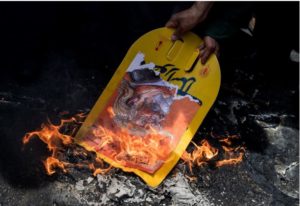 در روز یازده ماه می در تهران، ایرانیان در اعتراض به تصمیم ترامپ مبنی بر خروج از معاهده هستهای ۲۰۱۵، تصویری از او را سوزاندند. (خبرگزاری تسنیم به نقل از رویترز)
در روز یازده ماه می در تهران، ایرانیان در اعتراض به تصمیم ترامپ مبنی بر خروج از معاهده هستهای ۲۰۱۵، تصویری از او را سوزاندند. (خبرگزاری تسنیم به نقل از رویترز)
“مایکل مکفاول” مدیر موسسه Freeman Spogli برای مطالعات بینالمللی، همور هوور در دانشگاه استنفورد و روزنامهنگاری مشارکتی برای The Post است. او از سال ۲۰۰۹ تا ۲۰۱۲ معاون رئیسجمهور باراک اوباما در شورای امنیت ملی و از سال ۲۰۱۲ تا ۲۰۱۴ سفیر ایالات متحده در روسیه بوده، عباس میلانی نیز یک همکار پژوهشی و همکاری در پروژهی دموکراسی ایران در موسسهی هوور است.
در هشتم ماه می، پس از آنکه رئیسجمهور ترامپ به یکباره از معاملهی هستهای ایران کنارهگیری کرد، بسیاری از تحلیلگران متعجب شدند و این سوال پیش آمد که آیا او عمدتن به دنبال تضعیف یکی دیگر از دستاوردهای سیاست خارجی خودش است؟ منطق ترامپ برای رها کردن برجام این بود: آن معامله (برجام) آرامش و صلح را ایجاد نکرد و هرگز هم ایجاد نخواهد کرد».
از آن روز به بعد، مقامات و سرپرستان ادارهی ترامپ، تنها گزارههای مبهمی از نقشه B خود را ارائه دادهاند. مایک پمپئو وزیر امور خارجهی آمریکا، دوازده شرط برای بازگشت به مذاکرات با تهران اعلام کرده و از مفاد شرایط او روشن است که دولت هیچ علاقهای به معاملهی کنترل تسلیحات جدید ندارد و در عوض، رئیسجمهور و همراهانش میخواهند از دور جدید تحریمهای اقتصادی استفاده کنند تا رژیم جمهوری اسلامی متحمل فشار بیشتری بشود. ترامپ و مشاورانش معتقدند که رنج اجتماعی ناشی از تحریمها، ملاها را مجبور خواهد کرد که امتیازات بیشتری به ایالات متحده بدهند و یا شاید حتی باعث تغییر رژیم شوند.
جان بولتون، مشاور امنیت ملی بهطور رسمی اعلام کرده که تغییر رژیم ایران در این زمان، سیاست دولت نیست (هرچند بولتون و پومپئو از سالیان سال به چنین موقعیتی احترام می گذارند). بسیاری از سیاسیون ایران معتقدند که رهبر ایران آیتالله علی خامنهای و سپاه پاسداران انقلاب اسلامی قادر به قبول چنین شرایطی نیستند و تنها گزینهی باقی مانده، مقابلهی بیشتر است و شاید حتی نوعی مقابلهی نظامی هم مطرح باشد.
مطمئنن در دراز مدت، گذار به دموکراسی در ایران، موثرترین راه برای کاهش تنش بین ایران و ایالات متحده و تضمین نقش منطقهای کمتر برای تضعیف تهران خواهد بود. ایران دموکراتیک بهطور بالقوه میتواند شریکی استراتژیک برای ایالات متحده (و حتی اسرائیل) باشد. با این حال، اقدامات ترامپ و برنامهی دوازده مرحلهای پومپئو، احتمال این نتیجه را کم میکند و این در حالیست که به منافع امنیت هستهای آمریکا نیز آسیب میرساند، و معمولن سخنرانی تند و تیز همیشه بدل به سیاست موثری نمیشود. برخی امیدوارند تناقض جدیدی که از واشنگتن بهدست میآید، تئوکراسی ایران را تضعیف کند و چنین احتمالی دور از دسترس نیست.
چند هفته پس از شروع ماه دسامبر، طبقهی کارگر و فرودست ایران که معمولن حامی رژیم هستند، به خیابانها آمدند تا اعتراض خود را نسبت به مدیریت ناعادلانهی اقتصاد توسط رهبر عالی و متحدان محافظهکار خود انجام دهند. بسیاری از ایرانیها به جای توطئهی امپریالیسم آمریكا، فتنهای را که در داخل کشور رخنه کرده، سرزنش کردند و در نماز جمعهی سراسر کشور و بین رهبران نمازخوان، چندین بار اعلام کردند: “دشمن ما همینجاست نه در ایالات متحده.” صاحبنظران در داخل ایران، در مورد سوءاستفاده از صدها میلیون دلار برای ماجراجوییهای خارجی در سوریه، یمن و لبنان مورد سوال قرار گرفتند. بعضیها نیز به مبالغ هنگفت و مبهمی که به پایههای مذهبی پرداخت میشود، هجوم بردند. در این ماه، با شدت گرفتن تهدید سران سختگیر ایران، بسیاری از ایرانیان خواستار همکاری بیشتر با غرب به عنوان یک راه برای حل مشکلات کشور شدند.
با این حال، ترامپ در تصمیمش راجع به ایران به منافع آمریکا توجه کرده است. حالا رژیم جمهوری اسلامی شاهد جدیدی برای استدلال خود دارد، مبنی بر اینکه ایالات متحده، تحت فشار اسرائیل و عربستان سعودی، تلاش میکند مردم ایران را نابود سازد. ایرانیان میهنپرست، از جمله کسانی که مخالف رژیم استبدادی هستند، در حال حاضر احتمالن در اطراف پرچم آمریکا، بر ضد دولت آمریکا تظاهرات خواهند کرد، درست همانطور که در دورههای قبل از افزایش تهدیدات خارجی هم این کار را کردند.
تندروها در ایران که با ترامپ موافق بودند و اعتقاد داشتند که معاملهی هستهای بدترین توافق در تاریخ مدرن ایران بود، در حال حاضر با یادآوری گذشته میگویند که در مورد آمریکاییهای فریبکار درست گفتهاند. رژیم تئوکراتیک در حالی خود را در موقعیت غیرمعمول با ایستادن در کنار جامعهی بینالمللی قرار میدهد که ایالات متحده از برجام جدا شده است. این تغییر نقش در بین ایالات متحده و جمهوری اسلامی، خودکامگیهای رژیم ایران را تقویت میکند.
تقریبن همهی کسانی که برای تغییر دموکراتیک در داخل ایران مبارزه میکنند، از معاملهی هستهای و لغو تحریمهایی که با آن مواجه بودند، استقبال کردهاند. نشانههای ابتدایی نشان میدهد که آنها با حرکتهای مخالفتجویانهی ترامپ در زمینهی برجام مخالفت خواهند کرد. جمعیت پراکندهای در خارج و حتی داخل ایران سخنرانی جدید و خشن دولت ترامپ را تکرار میکنند، تکرار مکررات که رهبر فعلی تنها اجبار و زور را درک میکند، آنها بیشتر از این میترسند که این سخنرانی در نهایت به نفع همان ملاهایی که حکومت استبدادی را برقرار کردهاند، تمام شود و فاجعهای دیگر رخ دهد. بسیاری نیز نگرانند که سیاست جدید، ایران را به روابط نزدیکتر با روسیه و چین ترغیب خواهد کرد که آن هم هدف استراتژیک خامنهای و متحدانش در طول سالیان دراز است. در نظر گرفتن اقدامات خصمانهی ایران در خارج از کشور و همچنین درگیر شدن در برنامهی کنترل تسلیحات برای محدود کردن برنامهی موشکی بالستیک ایران و حمایت از ایدههای دموکراسی و حقوق بشر باید اولویت دولت ترامپ باشد و در کل تمام عناصر یک استراتژی جامع برای برخورد با ایران میتوانست بدون بیرون آمدن از توافق هستهای مورد پیگیری قرار بگیرد.
آنها هنوز هم میتوانند بدون اعمال اجبار برای تغییر رژیم در ایران به پیگرد (تحریم) ادامه دهند، هدفِ دموکراتیزه کردن بد نیست، اما در حال حاضر استراتژی انتخاب شده توسط ترامپ موفق نخواهد شد. زمانی دموکراسی به ایران میآید که مردم ایران با حاکمان بیرحم و بیکفایت خود تسویه حساب کنند و متاسفانه استراتژی جدید ترامپ این تسویه حساب را به تعویق میاندازد.
Global Opinions
Why Trump’s plans for regime change in Iran will have the opposite effect
By Michael McFaul and Abbas Milani
May 30
Iranians burn an image of President Trump during a protest in Tehran on May 11 against his decision to withdraw from the 2015 nuclear deal. (Tasnim News Agency via Reuters)
Michael McFaul is director of the Freeman Spogli Institute for International Studies, a Hoover fellow at Stanford University and a contributing columnist for The Post. He was previously special assistant to President Barack Obama at the National Security Council from 2009 to 2012 and U.S. ambassador to Russia from 2012 to 2014. Abbas Milani is a research fellow and co-director of the Iran Democracy Project at the Hoover Institution.
After President Trump unilaterally withdrew from the Iran nuclear deal on May 8, many analysts wondered whether he was primarily motivated by the desire to undermine yet another of his predecessor’s foreign policy achievements. Among the rationales Trump gave for abandoning the deal were that “it didn’t bring calm, it didn’t bring peace, and it never will.”
Since then, Trump administration officials and surrogates have offered only vague outlines of their Plan B. Secretary of State Mike Pompeo has announced 12 conditions for returning to talks with Tehran, and his conditions make clear that the administration has no interest in a new arms-control deal. Instead, the president and his entourage want to use a new round of economic sanctions to put more pressure on the regime. Trump and his advisers believe that, at minimum, the resulting societal suffering will compel the mullahs to offer even greater concessions to the United States — or perhaps even trigger regime change.
Officially, national security adviser John Bolton has stated that regime change is not administration policy at this time (even though both Bolton and Pompeo have advocated just such a position for years). Iranians of many different political persuasions believe that neither their supreme leader, Ayatollah Ali Khamenei, nor his Revolutionary Guard Corps would ever be able to accept such terms. The only remaining option is greater confrontation — maybe even of a military kind.
Over the long term, certainly, a transition to democracy in Iran would be the most effective way to reduce tensions between Iran and the United States and to guarantee a less disruptive regional role for Tehran. A democratic Iran could potentially become a strategic partner for the United States (and even Israel). Yet Trump’s actions and Pompeo’s 12-step program make that outcome less likely while damaging other core American national security interests. Tough rhetoric doesn’t always translate into effective policy. Some hope that this new confrontational tone coming from Washington might weaken Iran’s theocracy. In fact, however, the opposite is more likely.
For several weeks starting in December, Iran’s working class and poor, usually the bulwarks of regime support, took to the streets to protest gross mismanagement of the economy by the supreme leader and his conservative allies. Many Iranians have taken to blaming domestic corruption rather than American imperialism for their country’s dismal state. In Friday prayers around the country, the faithful jeer and boo their prayer leaders, on several occasions declaring “our enemy is here, not in the United States.” Commentators inside Iran have been questioning the hundreds of millions spent on foreign adventures in Syria, Yemen and Lebanon. Some also have assailed the vast and opaque sums paid to religious foundations. Until this month, much to the consternation of Iranian hard-liners, many Iranians were urging greater engagement with the West as a solution to the country’s problems.
Trump’s decision, however, has turned attention inside Iran back on the United States. The regime now has new evidence for its argument that the United States — pressured by Israel and Saudi Arabia — is seeking to impoverish the Iranian people. Patriotic Iranians, including those opposed to the autocratic regime, are now likely to rally around the flag, just as they have done during earlier periods of rising external threats.
The hard-liners in Iran, who agreed with Trump that the nuclear deal was the worst agreement in modern Iranian history, now trumpet that they were right all along about the deceptive Americans. The theocratic regime finds itself in the unusual position of enjoying good standing with the international community while the United States is isolated. This reversal in roles between the United States and the Islamic republic strengthens Iran’s autocrats.
Almost all of those fighting for democratic change inside Iran welcomed the nuclear deal and the lifting of sanctions that went with it. Initial signs suggest that they oppose the Trump administration’s new confrontational moves. While some in the Iranian diaspora and even inside Iran embrace the new tough rhetoric of the Trump administration — repeating the refrain that the current leadership only understands force — most seem to fear that this rhetoric will ultimately benefit the same mullahs whose despotic rule has been a disaster. Many also worry that the new policy will further push Iran into even closer ties to Russia and China — for years, a strategic objective of Khamenei and his allies.
Containing Iran’s belligerent actions abroad should be a high priority for the Trump administration, as well as engaging in arms control to limit Iran’s ballistic missile program and supporting ideas of democracy and human rights. Yet all these elements of a comprehensive strategy for dealing with Iran could have been pursued without withdrawing from the Iran nuclear deal.
And they can still be pursued without pursuing coercive regime change — not because the goal of democratization is a bad one, but because the strategy selected by Trump will not succeed. Democracy will come to Iran when the people of Iran have their reckoning with their ruthless and incompetent rulers. Tragically, the new Trump strategy delays that reckoning.
Michael McFaul is director of the Freeman Spogli Institute for International Studies and a Hoover fellow at Stanford University, and a contributing columnist to The Post. He was previously special assistant to President Obama at the National Security Council from 2009-2012 and former U.S. ambassador to Russia from 2012-2014. Follow @McFaul
Abbas Milani is a research fellow
ممکن است به این موارد نیز علاقه مند باشید
 در روز یازده ماه می در تهران، ایرانیان در اعتراض به تصمیم ترامپ مبنی بر خروج از معاهده هستهای ۲۰۱۵، تصویری از او را سوزاندند. (خبرگزاری تسنیم به نقل از رویترز)
در روز یازده ماه می در تهران، ایرانیان در اعتراض به تصمیم ترامپ مبنی بر خروج از معاهده هستهای ۲۰۱۵، تصویری از او را سوزاندند. (خبرگزاری تسنیم به نقل از رویترز)





